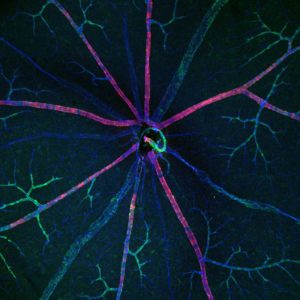Support Gould Syndrome Awareness & Research on Rare Disease Day (Feb. 28) and Gould Syndrome Awareness Day (April 12)!
We kicked-off a new challenge on Rare Disease Day – February 28 to raise awareness and support for Gould Syndrome research. Gould Syndrome was named for UCSF geneticist Dr. Douglas Gould, Director and Vice Chair for Research for the Department of Ophthalmology. Gould Syndrome Awareness Day is April 12, 2023.
Over the last year, All May See has been working to raise awareness of Gould Syndrome as well as raise research dollars. Some highlights include:
- Last February’s match challenge (featured on p. 12 of our Summer 2022 Vision magazine) with an anonymous donation from a Texas Family whose 9-year-old son was recently diagnosed with Gould Syndrome.
- Lap for Landon Fundraising Walk – held last October, in honor of Landon who was recently diagnosed with Gould Syndrome. Over 150 people gathered in the pouring rain, in St. Louis, to celebrate Landon’s first birthday and to raise awareness for Gould Syndrome.
- To date, through the generous donations of individuals and families from around the globe affected or impacted by Gould Syndrome, we have raised over $185,000.
Our challenge is to raise the total donation to the Gould Lab at the University of California, San Francisco (UCSF) Department of Ophthalmology to $250,000 – we’re just $65,000 away!
The purpose of the funds is to better understand the mechanisms underlying Gould Syndrome caused by mutations in COL4A1 and COL4A2. Dr. Gould’s lab is exploring therapeutic avenues such as using CRISPR gene-editing technology, which may have promise to help individuals affected by Gould Syndrome.
Can we count on you to make a gift now, when this means so much? (Select – Designation, Other, type “Gould Syndrome”)
 WHAT IS GOULD SYNDROME?
WHAT IS GOULD SYNDROME?
Gould Syndrome is a rare, genetic, multi-system disorder typically characterized by abnormal blood vessels in the brain, eye development defects and glaucoma, muscle disease, and kidney abnormalities; however, many other aspects of the syndrome continue to emerge and the full spectrum is still uncharacterized.2
The signs and symptoms, are highly variable and different organs are affected to different degrees between patients. The variability and severity of symptoms is so broad that the way an individual is affected can be novel and unique.2
In the brain, outcomes can range from hemorrhages before birth leading to cerebral cavities to mild age-related brain abnormalities that can only be observed on MRI.2 Approximately one-third of individuals have cataracts at birth or developmental defects of the front of the eye that can cause early onset glaucoma.
As genetic screening becomes more common, the number of individuals with Gould syndrome continues to climb all over the world. Because it is a rare disease, there is a disproportionate burden on families to understand the disease and chart the course for clinical care.
Learn more about Gould Syndrome
THE WORK YOUR GIFT SUPPORT
The Gould Lab at UCSF
Our broad scientific mission is to understand the biological functions of a specialized extracellular matrix structure called the Basement Membrane.
Our primary focus is Gould Syndrome; a multi-system disorder that is caused by mutations in the genes encoding type IV collagen alpha 1 (COL4A1) and COL4A2.
Our goal is to understand the tissue-specific molecular mechanisms that underlie this syndrome and develop mechanism-based therapies that can prevent, reduce or delay disease in patients.
Step inside to learn more about what we are doing and the people that are making it all happen!3
Resources:
- Epilepsy and related challenges in children with COL4A1 and COL4A2 mutations: A Gould syndrome patient registry – https://pubmed.ncbi.nlm.nih.gov/34735964/
- COL4A1/A2-Related Disorders – https://rarediseases.org/rare-diseases/col4a1-a2-related-disorders/
- UCSF Department of Ophthalmology – Gould Lab – https://ophthalmology.ucsf.edu/gouldlab/